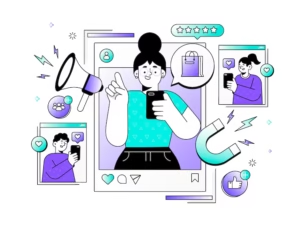The Future of Digital Marketing in 2025
As we stand on the brink of a new era in digital marketing, we find ourselves surrounded by rapid advancements and transformative changes that are reshaping the landscape. The future of digital marketing is not just about adopting new tools and technologies; it is about understanding how these innovations can enhance our strategies and connect us more deeply with our audiences. With the rise of new platforms, evolving consumer behaviors, and the increasing importance of data-driven decision-making, we are entering a phase where adaptability and creativity will be paramount.
In this dynamic environment, we must recognize that the future of digital marketing will be defined by our ability to leverage emerging technologies while maintaining a focus on personalization and customer experience. As we explore the various facets of this evolving field, we will uncover the trends and tools that will shape our strategies in the coming years. By embracing these changes, we can position ourselves to not only meet the demands of our customers but also to exceed their expectations in ways that were previously unimaginable.
Key Takeaways
- Digital marketing is constantly evolving and businesses need to stay updated with the latest trends and technologies to stay competitive.
- Emerging technologies such as AI, AR, and VR are reshaping the digital marketing landscape and providing new opportunities for engaging with customers.
- Personalization and customer experience are becoming increasingly important in digital marketing, as consumers expect tailored and relevant content.
- AI and machine learning are revolutionizing digital marketing by enabling more accurate targeting, predictive analytics, and automation of repetitive tasks.
- Data privacy and security are critical considerations for digital marketers, as consumers are becoming more aware of their rights and the importance of protecting their personal information.
Emerging Technologies in Digital Marketing
Immersive Experiences with AR and VR
From augmented reality (AR) to virtual reality (VR), these technologies are offering new and innovative ways to engage with consumers. AR, for instance, enables the creation of immersive experiences that allow customers to visualize products in their own environments before making a purchase. This not only enhances the shopping experience but also reduces the likelihood of returns, ultimately benefiting both consumers and businesses alike.
Building Trust with Blockchain Technology
Moreover, the integration of blockchain technology is beginning to make a significant impact in digital marketing. By providing a secure and transparent way to track transactions and consumer interactions, blockchain can help build trust with our audiences. This technology can also streamline processes such as ad buying and data sharing, making our marketing efforts more efficient.
Fostering Deeper Connections with Emerging Technologies
As we continue to explore these emerging technologies, it is essential that we remain open to experimenting with new tools that can elevate our marketing strategies and foster deeper connections with our customers. By embracing these innovations, we can unlock new opportunities for growth and stay ahead of the curve in the rapidly evolving digital marketing landscape.
Personalization and Customer Experience

In an age where consumers are bombarded with information, personalization has emerged as a critical component of effective digital marketing. We have come to understand that one-size-fits-all approaches are no longer sufficient; instead, we must tailor our messages and offerings to meet the unique needs and preferences of each individual. By leveraging data analytics and customer insights, we can create personalized experiences that resonate with our audiences on a deeper level.
The importance of customer experience cannot be overstated. As we strive to create meaningful interactions, we must consider every touchpoint along the customer journey. From the initial awareness stage to post-purchase follow-ups, each interaction presents an opportunity for us to enhance the overall experience.
By prioritizing personalization and customer experience, we can foster loyalty and advocacy among our customers, ultimately driving long-term success for our brands.
The Impact of Artificial Intelligence and Machine Learning
Artificial intelligence (AI) and machine learning are at the forefront of the digital marketing revolution, offering us powerful tools to analyze data, predict consumer behavior, and optimize campaigns. These technologies enable us to process vast amounts of information quickly, allowing us to make informed decisions based on real-time insights. For instance, AI-driven algorithms can help us identify trends in consumer behavior, enabling us to tailor our marketing strategies accordingly.
Furthermore, machine learning can enhance our targeting efforts by analyzing user data to deliver personalized content at the right time and place. This level of precision not only improves engagement rates but also increases conversion rates as we deliver relevant messages to our audiences. As we continue to harness the power of AI and machine learning, we must remain vigilant about ethical considerations and ensure that we use these technologies responsibly to build trust with our customers.
The Role of Data Privacy and Security
As digital marketing becomes increasingly data-driven, the importance of data privacy and security cannot be overlooked. With consumers becoming more aware of their rights regarding personal information, we must prioritize transparency and ethical practices in our marketing efforts. This means being clear about how we collect, store, and use customer data while providing options for consumers to control their information.
In addition to building trust through transparency, we must also invest in robust security measures to protect sensitive data from breaches and cyber threats. As regulations such as GDPR and CCPA continue to evolve, it is essential for us to stay informed about compliance requirements and implement best practices for data protection. By prioritizing data privacy and security, we can create a safe environment for our customers while enhancing our brand reputation.
The Evolution of Social Media Marketing

Social media has transformed the way we connect with consumers, and its evolution continues to shape our digital marketing strategies. As platforms like TikTok and Instagram gain popularity, we must adapt our approaches to engage audiences effectively on these channels. Short-form video content has become a dominant trend, prompting us to create engaging visuals that capture attention quickly.
Moreover, social media is increasingly becoming a space for authentic interactions between brands and consumers. We must embrace this shift by fostering genuine connections through user-generated content, community engagement, and responsive communication. By prioritizing authenticity in our social media marketing efforts, we can build stronger relationships with our audiences and enhance brand loyalty.
The Importance of Content Marketing and SEO
Content marketing remains a cornerstone of effective digital marketing strategies as we move into the future. High-quality content not only helps us establish authority in our industries but also drives organic traffic through search engine optimization (SEO). As search algorithms continue to evolve, we must focus on creating valuable content that addresses the needs and interests of our target audiences.
In addition to producing compelling content, we must also optimize it for search engines by incorporating relevant keywords, improving site speed, and ensuring mobile-friendliness. By aligning our content marketing efforts with SEO best practices, we can increase visibility and attract more qualified leads. As we navigate this ever-changing landscape, it is crucial for us to stay informed about emerging trends in content creation and SEO strategies to maintain a competitive edge.
Navigating the Digital Marketing Landscape in 2024
As we look ahead to 2024, it is clear that the future of digital marketing will be shaped by a combination of emerging technologies, personalization strategies, ethical practices, and evolving consumer behaviors. To thrive in this landscape, we must remain agile and open-minded, continuously adapting our approaches to meet the changing needs of our audiences. By embracing innovation while prioritizing customer experience and data privacy, we can build lasting relationships with our customers and drive sustainable growth for our brands.
As we navigate this complex digital marketing landscape together, let us commit to staying informed about industry trends and best practices so that we can effectively connect with our audiences in meaningful ways. The journey ahead may be challenging, but it is also filled with opportunities for creativity and connection that will define the future of digital marketing.
For those interested in the broader implications of digital trends, particularly in the realm of marketing, a related article worth exploring is “What is Online SEO Web Development Services?” by Techno Softwares. This piece delves into the integration of SEO strategies within web development, a crucial aspect for enhancing digital marketing effectiveness. Understanding these services can provide deeper insights into the technical strategies that will likely influence digital marketing trends in 2024. You can read more about this topic by visiting What is Online SEO Web Development Services?.
FAQs
What is digital marketing?
Digital marketing is the use of digital channels such as social media, search engines, email, and websites to connect with current and prospective customers. It encompasses a wide range of online marketing activities aimed at promoting products or services.
What are some key trends in digital marketing for 2024?
Some key trends in digital marketing for 2024 include the increasing use of artificial intelligence and machine learning, the rise of voice search and smart speakers, the importance of personalized and interactive content, and the continued growth of video marketing.
How is artificial intelligence (AI) impacting digital marketing?
AI is impacting digital marketing by enabling more personalized customer experiences, improving data analysis and targeting, automating repetitive tasks, and enhancing chatbots and virtual assistants for customer service.
What role does data privacy and security play in the future of digital marketing?
Data privacy and security are becoming increasingly important in digital marketing due to stricter regulations such as GDPR and the growing concern for consumer privacy. Marketers need to prioritize data protection and transparency to build trust with their audience.
How is the use of video evolving in digital marketing?
Video is becoming a dominant form of content in digital marketing, with the rise of short-form videos on platforms like TikTok and Instagram, as well as the increasing popularity of live streaming and interactive video content. Marketers are leveraging video to engage and connect with their audience in new ways.
What are some challenges and opportunities in the future of digital marketing?
Challenges in the future of digital marketing include the need to adapt to evolving technology and consumer behavior, as well as the increasing competition for audience attention. Opportunities include the ability to leverage data and technology for more targeted and personalized marketing, as well as the potential for creativity and innovation in content and campaigns.





